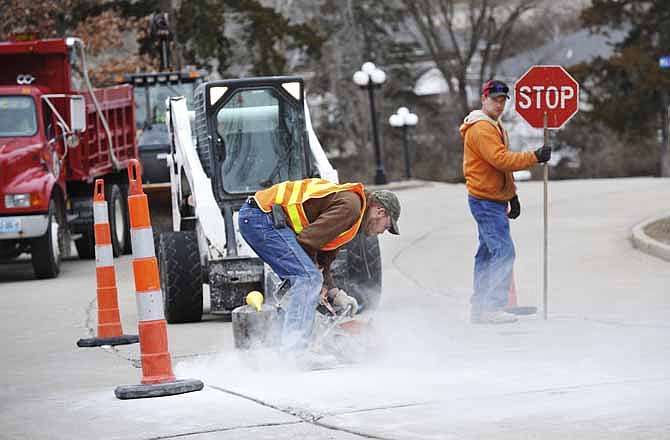Jefferson City is preparing for its annual summer street repair project, which would repave about 15 miles of roads and work on nearly 35 miles.
The project, which the City Council is expected to vote on July 19, includes three different measures to repair or restore streets.
"Everything I'm talking about is trying to increase that longevity and get the most bang for our buck," Public Works Operation Division Director Britt Smith said.
The Public Works Department receives $1.2 million annually through the city's half-cent capital improvements sales tax.
"If we did not have the half-cent sales tax program, we'd either not do that work or we'd have to find that $1.2 million each year someplace else," he said.
The projects focuses on asphalt streets. Smith said city staff does most concrete street maintenance in-house.
The least-involved part places a protective seal on about 16.7 miles of street. Smith said these are new or recently repaved roads.
"It just helps seal up that pavement, and the less water that gets into the pavement, the fewer problems we have," he said.
The bid for that project is $97,000.
Work would mostly focus on 6.62 miles of road in Ward 1 and 4.34 miles in Ward 3.
Other areas, about 3.21 miles, will undergo a process called micro-surfacing.
Smith said these are mostly 7- to 10-year-old roads that don't need to be fully repaved but could use some work.
"Micro-surfacing is basically putting another surface right on top of what's already there," he said. "It's putting pressure and injecting that asphalt material into any cracks of the existing surface and then leveling over the top."
The micro-surfacing part of the project is bid at $142,692, with work mostly to be done on 0.69 of road in Ward 4 and 2.24 miles in Ward 5.
The last and largest piece of the project is mill and surface overlay of 15.07 miles of road.
Smith said this includes breaking the top surface and removing it in order to lay fresh asphalt.
"The thickness of that mill and surface overlay kind of depends on the use of the road," he said. "It might be an inch-and-a-half surface, or it might be 2 inches, or it could be something we call full depth. We won't do a lot of full depth this year, luckily; that eats up a lot of money."
The overlay portion is bid at $968,030, with a focus on 5.82 miles of road in Ward 2 and and 6.74 miles in Ward 3.
Smith said the projects tend to be planned closer together to avoid moving equipment throughout the city.
"It's fairly typical that we try to stay in the same general area because every time you're picking up equipment and moving it around, you pay a contractor to do that," Smith said.
Public Works Director Matt Morasch said work could start within 10 days of City Council approval but depends on the contractor's schedule.
"If someone lives or travels a street that is on the list, they can expect to see small signs in the area a few days prior to the actual work happening," he said. "All the work will be completed by the end of summer."

